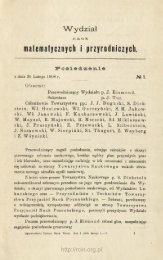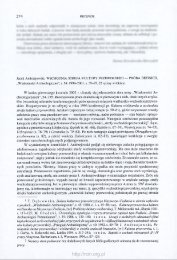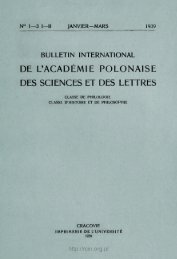PROGRESS IN PROTOZOOLOGY
PROGRESS IN PROTOZOOLOGY
PROGRESS IN PROTOZOOLOGY
Create successful ePaper yourself
Turn your PDF publications into a flip-book with our unique Google optimized e-Paper software.
210<br />
those times PROTOZOA were regarded as unicellular eukaryotic organisms<br />
which gave rise to METAZOA. The origin of the multicellular<br />
animals was explained differently by various authors, starting with<br />
the gastrea theory of E. H a e c k e 1. However, the most common of<br />
the theories proposed through the years was that METAZOA originated<br />
from the unicellular eukaryotes, PROTOZOA.<br />
Origins of the protozoan taxa were considered first in the pioneering<br />
works of Butschli (1884, 1885, 1887, 1889). The idea of a monophyletic<br />
origin of the PROTOZOA was the basis of all theories on their<br />
evolution. Either the naked amebae or the flagellates were considered<br />
by different workers as the ancestors of all other eukaryotic groups,<br />
including PROTOZOA.<br />
During the last two decades, the originally simple scheme has undergone<br />
numerous drastic changes. The great progress in biology, especially<br />
in the fields of electron microscopy, molecular biology, and biochemistry,<br />
necessitated major revisions of theories previously believed<br />
to be unassailable. Among the questions which have arisen as a result<br />
of recent developments is whether the PROTOZOA constitute a natural<br />
group. This question is associated with the concept of the origin of<br />
eukaryotes and with that of their mono- vs polyphyletic evolution.<br />
The elucidation of these problems in a manner which would take<br />
into account the vast body of information available in published works<br />
would necessitate writing an entire book. Such an approach is, of course,<br />
beyond the scope of my short presentation. This presentation is intended<br />
merely to open a discussion. Because of time limitations, some<br />
of the opinions I shall express cannot be illustrated by supporting factual<br />
evidence; therefore, my assertions may sound somewhat dogmatic.<br />
The first problem I shall address pertains to the kinds of relationships<br />
existing between Prokaryota and Eukaryota. The question is whether<br />
these two main forms of organisms evolved independently of each<br />
other or if the latter found their origin in the former.<br />
Both of the aforementioned views find adherents among scientists;<br />
I am inclined to support the concept of prokaryote ancestry of the eukaryotes.<br />
Indeed, although there exist obvious differences between the<br />
two groups of organisms, their most important vital processes are essentially<br />
the same. Among the processes shared by the pro- and eukaryotes<br />
are: storage, replication, transcription, and translation of hereditary<br />
information by DNA and RNA. The common origin of Pro- and<br />
Eukaryota is supported also by their similar batteries of enzymes mediating<br />
various metabolic processes. The results of genetic engineering can<br />
be used as additional evidence in support of the common origin of the<br />
two kinds or organisms, e.g., it is known that some eukaryotic genes<br />
http://rcin.org.pl

















